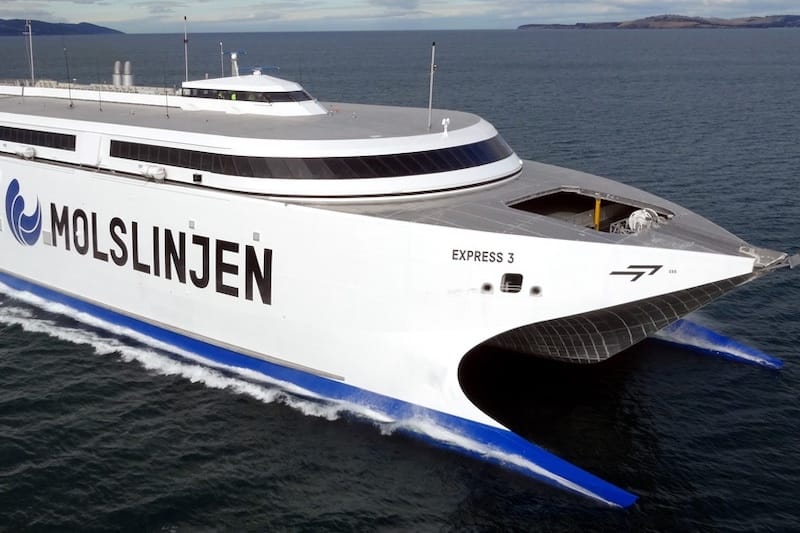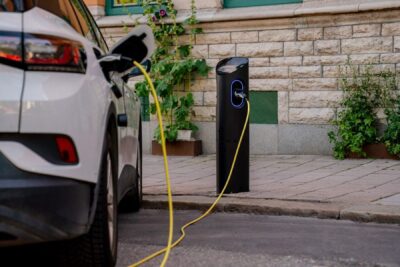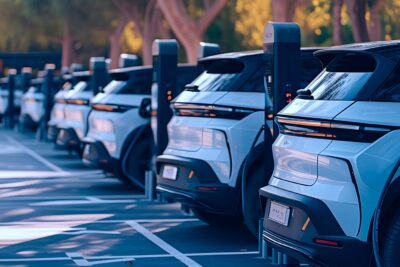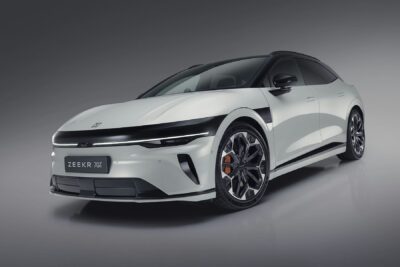Incat Tasmania to build electric ferries for Denmark
The ferries will be used to carry up to 1483 passengers and 500 cars, travelling at speeds of over 40 knots across the Kattegat Sea between Aarhus and Sjællands Odde (Odden). This is an enormously busy waterway, and Moslinjen has long used it to provide travel between two of the most populated islands in Denmark from ports in Aarhus, Odden, and Ebeltoft. Incat has previously built fuel-powered vessels for Moslinjen, which are currently in operation in this area.
The two ferries are expected to be complete by the start of 2028, with Moslinjen reportedly also in dialogue with Incat to receive a third vessel in the form of a catamaran. The construction of the three ferries, including the associated land infrastructure, would cost a total of around 3.5bn Danish kroner (€468 million) and reduce the annual climate impact of ferry operations by around 132,000 tons of CO2. The ferries will be charged at harbours in Aarhus and Odden, and once constructed, will be 11 per cent larger than Bornholmslinjen’s Express 5 which is currently the world’s largest catamaran by vehicle capacity.
In what Incat has called “part of the world’s largest electrification project at sea”, the order is set to coincide with the expansion of Incat’s production facilities at Prince of Wales Bay in Tasmania. This expansion should make it possible for the company to double its capacity and workforce during the next three years.
Incat Chairman Robert Clifford said: “These new vessels for Molslinjen mark a turning point not just for Incat but for the global maritime industry. They are part of a new class of high-speed, low-emission ships that are redefining what’s possible at sea. We’re honoured to again partner with Molslinjen, and proud to help them deliver real environmental change on one of Europe’s busiest ferry routes.”
Kristian Durhuus, the director of Molslinjen, added: “This is a massive undertaking, involving not just the three ferries but also extensive land-based infrastructure projects and energy storage systems for the new ships.”
Update 16 September 2025
Wärtsilä Corporation has been selected to supply fully integrated electric propulsion systems with waterjets for the two high-speed battery-electric catamaran ferries being built by Incat Tasmania for Danish operator Molslinjen. Wärtsilä will provide the propulsion system, DC power conversion, energy management and automation systems, eight electric motors with waterjets, and the ProTouch propulsion control system to enable smooth and efficient sailing.
The eight waterjets per vessel are designed for low weight, shallow draft operation, low maintenance, safety, reliability and high manoeuvrability, with integrated steering and reversing for quick response. Power division across multiple jets reduces power density, enhancing overall propulsion efficiency. Wärtsilä equipment delivery to the Incat shipyard is scheduled to begin in 2026.
“This is a major project that supports the ferry industry’s move towards more decarbonised operations,” said Kristian Durhuus, CEO of Molslinjen. “With these electric ferries built by Incat and powered by Wärtsilä’s electrification technology, we aim to remove thousands of tons of CO₂ emissions from Denmark’s climate footprint each year.”
Stephen Casey, CEO of Incat Tasmania, added: “Large-scale, low-emission transport solutions are not only possible, but are ready now. Incat Tasmania has always been at the forefront of innovating and pioneering new technology and design. Wärtsilä is a key player in the success of this project, supporting our goal of large-scale, low-emission transport with a completely integrated propulsion package.”
Update 5 December 2025
As previously anticipated, Danish ferry operator Molslinjen has now ordered a third battery-powered giant catamaran from Incat Tasmania. This vessel also measures 129 metres in length and will likewise operate on the Kattegat routes between Aarhus–Odden and Ebeltoft–Odden.
Molslinjen CEO Kristian Durhuus says the decision to build all three ferries at Incat reflects the strength of the partnership and the company’s commitment to accelerating the ecological transition. “By building all three ferries at the same shipyard, we gain clear advantages and valuable learning from the first to the last vessel. And it is also important for us to have a stable and reliable partner, as we do with Incat. We and our owners are taking the lead and trying to show the way forward in the green transition using technology that, until recently, simply did not exist”, Durhuus said. Construction of all three electric ferries has already begun in Hobart, Australia. Delivery of the three electric vessels is planned for the coming years.
tv2ostjylland.dk, incat.com.au, molslinjen.dk, wartsila.com (update), incat.com.au (update II)





0 Comments